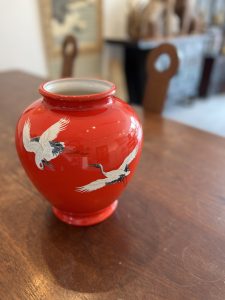3月と言えば・・・(愛知県名古屋市千種区姫池通 骨董品買取 古美術風光舎)
2024.03.01
みなさまこんにちは、スタッフTでございます。

いよいよ3月に入りました。毎度のことながら、もうひと月経ったのかと驚きますね。
年が明けてから3月までは、「1月は行く、2月は逃げる、3月は去る」という言葉もあるくらいですから、あっという間に過ぎ去るように感じられる期間ではあります。
そして気づけば、1年の4分の1が終わるわけですから、大人になればなるほど、「もう3月が終わるのか」と妙な焦りを感じるようになってしまいました。
さて、3月は日本では和風月名で「弥生」とも言いますね。ちなみに、12ヶ月の中で3月と12月だけが「月」という漢字が使われていません。
「弥生」とは、暖かな陽気にすべての草木がいよいよ茂るという意味の「弥生(いやおい)」がつまって、「弥生(やよい)」になったとされています。「弥」にはいよいよ、ますますという意味があり、「生」は草木が芽吹くことを表しています。
この他にも3月の異称(別名)として「桜月(さくらつき)」「花見月(はなみつき)」「花月(かげつ)」「花咲月(はなさきづき)」など、他にもたくさんの異称があります。これからは桜など、色々な花が咲く季節。今から楽しみです。
また、英語で3月は「March」ですが、これはローマ神話の「マルス(Mars)の月」を意味する「Martius」に由来します。 マルスは「戦と農耕の神」で、「軍神」とも呼ばれます。 古代ローマ暦では、新年が3月であり、気候がよくなり軍隊を動かす季節、また、農耕を始まる季節に良いとされ、そこから3月はマルスを称える月となりました。
さて、3月といえば、みなさんはどのようなことを思いつきますか?
3月と言われて私が一番に思い付くのは、「卒業式」。
あとは「ひな祭り」「春分の日」「春休み」といったところでしょうか。
日本では、幼稚園はじめ、全ての学校や大学で卒業式がありますが、欧米などでは大学の学位授与式しかないそうです。日本で学校制度が始まったのは、1872年(明治5年)。その当時は、学年を終えるときに卒業証書が授与されていました。
学年終了時の卒業証書授与が、1870年代半ば(明治10年)ごろに、独立した儀式として定着したのが卒業式の始まりで、現在、卒業式は、学校教育法施行規則で学校行事として定められています。
私たちが春の風物詩のように感じている「卒業式」は、実は日本特有の文化なんだとか。3月に卒業式がある国は数少なく、欧米では9月が卒業式シーズン。南半球になると12月など国によってさまざまです。
みんなで歌って涙する、感動の卒業式のイメージもありますが、私にとっての卒業式は、特に感動的な思い出はありません(笑)
思い返してみると、感動のシーンで泣かないといけないような妙なプレッシャーを感じて、なんとなく居心地が悪かった記憶があります。あと、何度も練習させられてちょっと面倒だった思い出が…。
卒業式と涙はセットのようになっていますが、歌にも特別な意味があるようです。卒業式の歌がこれほどたくさん存在する国は、日本だけのようです。
昭和世代は、卒業式の歌と言えば「蛍の光」と「仰げば尊し」が定番でした。ですが、 平成頃からは時代の変化で恩師への感謝を 強要しているという考えや、 古い日本語の表現を 理解することが難しいとの理由で 歌われなくなったようです。
代わりに歌われるようになったのが、「3月9日」や、合唱曲の「旅立ちの日に」。
別れを惜しみつつも前に進む人を応援してくれるような曲が多く歌われるようになった気がします。
卒業式の形も変わってきているのかもしれませんが、やはり全員で卒業ソングを歌うという文化はあった方が良いかもしれないですね。小学校、中学校の最低2回、高校を含めても3回くらいしか経験ができないですから。
ではでは、また。
Hello everyone, this is Staff T.
March has finally arrived. Every time I am surprised to see that another month has already passed.
There is a saying that goes “January goes, February runs away, and March goes away,” so it seems as if the time between the beginning of the year and March goes by in a flash.
And as I realize that a quarter of the year is over, the more I grow older, the more I feel a strange sense of impatience, wondering if March is already over.
Well, March is also called “Yayoi” in Japanese, which is a Japanese-style month name. Incidentally, of the 12 months, only March and December do not use the Chinese character for “month.
The word “Yayoi” is said to be derived from “Yayoi,” which means that all plants and trees will finally grow in the warm weather. Ya” means “finally” or “more and more,” and “Sei” means that plants and trees will sprout.
There are many other different names for March, such as “Sakura-tsuki,” “Hanami-tsuki,” “Kage-tsu,” and “Hanasaki-tsuki. From now on, it is the season for cherry blossoms and other flowers to bloom. I am looking forward to it.
March is also called “March” in English, which is derived from “Martius,” meaning “the month of Mars” in Roman mythology. Mars is the “god of war and agriculture” and is also called the “god of war. In the ancient Roman calendar, the New Year was in March, which was considered to be a good time for the weather to improve and for armies to move into action, and also a good time to begin farming, and from there March became the month to honor Mars.
What do you think of when you think of March?
The first thing that comes to mind when I hear the word “March” is “graduation ceremony. The others are “Girls’ Festival,” “Vernal Equinox Day,” and “Spring Vacation.
In Japan, all schools and universities, including kindergartens, have graduation ceremonies, but in Europe and the United States, only university degree conferment ceremonies are held.
The school system began in Japan in 1872. At that time, diplomas were awarded at the end of the school year.
The graduation ceremony began around the mid-1870s (10th year of Meiji), when the awarding of diplomas at the end of the school year became an independent ceremony.
Graduation ceremonies, which we feel like a spring tradition, are actually a culture unique to Japan; only a few countries have graduation ceremonies in March, and in Europe and the United States, the graduation season is in September. In the southern hemisphere, it is held in December, and it varies from country to country.
There is an image of a moving graduation ceremony where everyone sings and cries together, but for me, I have no particularly moving memories of graduation ceremonies (laugh).
Looking back, I remember feeling a strange pressure to cry during the emotional scenes and feeling somewhat uncomfortable. I also remember that I was made to practice many times, which was a bit troublesome….
Graduation ceremonies and tears are like a set, but the songs also seem to have a special meaning. Japan seems to be the only country where so many graduation songs exist.
For the Showa generation, “Hotarunohikari” and “Aogeba Toutoshi” were the standard graduation songs. However, since the Heisei era, these songs are no longer sung because of the change of the times, the idea that it forces people to thank their former teachers, and the difficulty in understanding the old Japanese expressions.
Instead, “March 9” and the choral piece “On the Day of Departure” have come to be sung.
I feel that more and more songs are being sung to bid farewell but also to cheer those who are moving on.
The shape of graduation ceremonies may be changing, but I still think it would be better to have a culture in which everyone sings a graduation song together. We only get to experience this at least twice in elementary and junior high school, and maybe three times if you include high school.
So, see you again.
*******************
ご実家の整理やお片付けなどをされている方のご相談などが多くございます。
お片付けなどくれぐれもご無理のないようになさってくださいませ。
風光舎では古美術品や骨董品の他にも絵画や宝石、趣味のお品など様々なジャンルのものを買受しております。
お片付けをされていて、こういうものでもいいのかしらと迷われているものでも、どうぞお気軽にご相談下さいませ。
また風光舎は、出張買取も強化しております。ご近所はもちろん、愛知県内、岐阜県、三重県その他の県へも出張いたします。
まずは、お電話お待ちしております。
愛知県名古屋市千種区姫池通
骨董 買取【古美術 風光舎 名古屋店】
TEL052(734)8444
10:00-18:00 OPEN

